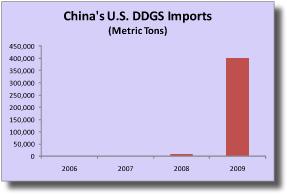The goal of the U.S. Grains Council’s distiller’s dried grains with solubles (DDGS) marketing programs is to gain access to a market and increase the rate of the adoption of the product into commercial feed rations using various means such as nutritional education, feeding trials. The mission is accomplished by product quality and pricing seminars and reducing trade barriers.
Last month, the Council sent consultants to Taiwan and China to assess the market in order to determine the level of DDGS product knowledge local producers, nutritionists and importers have in each country. The USGC team was also charged to evaluate the market penetration levels in the various feed market sectors, poultry, swine and dairy, of the importing country. Eric Brandt, a commodity trader for Global Ethanol, said there was substantial growth in both Taiwan and China, but trade barriers on the horizon may pose some threats to import.
According to Brandt, there are substantial growth opportunities in Taiwan as he believes they are currently only importing 30 percent of their potential. “Taiwan currently imports 200,000 metric tons of U.S. DDGS versus an estimated potential of 700,000 tons,� he said. “Issues that arose in 2009 going into 2010 include concerns with mycotoxin levels, container availability and a stable supply, and the price after tariffs are applied. The work the Council is doing in Taiwan is very helpful.
The education, seminars, technical programs and nutritional services are helping buyers make the decision to buy U.S. DDGS.� China saw an “explosion� of DDGS imports in 2009, said Brandt. An estimated 400,000-500,000 tons will be shipped to China for delivery in 2009. Only 8,000 tons were shipped in 2008. “According to buyers, the demand is substantial and could be up to one million tons for 2010. However, there is concern about what will happen regarding the DDGS registration,� he said. In May 2009, China’s Ministry of Agriculture (MOA) set regulation requiring processed feed grains products and ingredients, like DDGS, to have registration approval by the MOA before they can be legally imported. “The Council has been working with several of its members in obtaining product registration approval. This should lead to continued growth in China for U.S. DDGS and help overcome some of the potential constraints that could become an issue with future U.S. DDGS exports to China,� said Dan Keefe, USGC manager of international operations.


